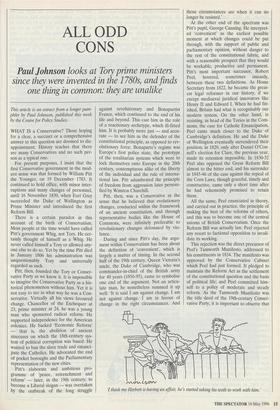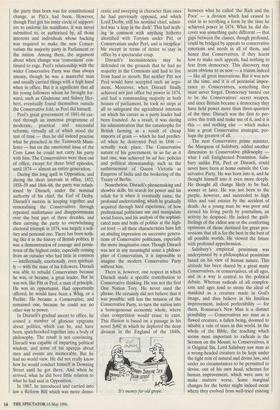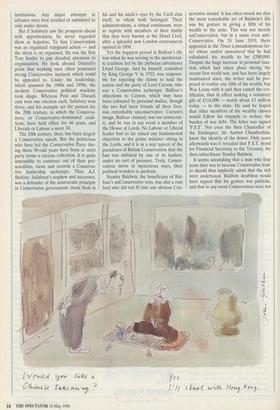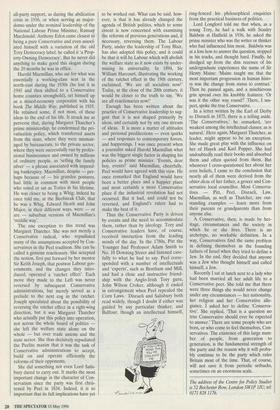ALL ODD CONS
Paul Johnson looks at Tory prime ministers since they were invented in the 1780s, and finds one thing in common: they are unalike
This article is an extract from a longer pam- phlet by Paul Johnson, published this week by the Centre for Policy Studies.
WHAT IS a Conservative? Those hoping for a clear, a succinct or a comprehensive answer to this question are doomed to dis- appointment. History teaches that there are many Conservatives and no such per- son as a typical one.
For present purposes, I insist that the first Conservative government in the mod- ern sense was that formed by William Pitt the Younger, on 19 December 1783. It continued to hold office, with minor inter- ruptions and many changes of personnel, until 16 November 1830, when Earl Grey succeeded the Duke, of Wellington as Prime Minister and introduced the first Reform Bill.
There is a certain paradox in this account of the birth of Conservatism. Most people at the time would have called Pitt's government Whig, not Tory. He cer- tainly thought of himself as a Whig. He never called himself a Tory or allowed any- one else to do so. Yet by the time Pitt died in January 1806 his administration was unquestionably Tory and universally regarded as such.
Pitt, then, founded the Tory or Conser- vative Party as we know it. It is impossible to imagine the Conservative Party as a his- torical phenomenon without him. Yet it is not easy to see in what way he was a Con- servative. Virtually all his views favoured change. Chancellor of the Exchequer at 23, prime minister at 24, he was a young man who sponsored radical reform. He supported independence for the American colonies. He backed `Economic Reform' — that is, the abolition of ancient sinecures on which the 18th-century sys- tem of political corruption was based. He wanted to ban the slave trade and emanci- pate the Catholics. He advocated the end of pocket boroughs and the Parliamentary representation of the new cities.
Pitt's elaborate and ambitious pro- gramme of 'peace, retrenchment and reform' — later, in the 19th century, to become a Liberal slogan — was overtaken by the outbreak of the long struggle against revolutionary and Bonapartist France, which continued to the end of his life and beyond. This cast him in the role of a reactionary archetype, which ill-fitted him. It is probably more just — and accu- rate — to see him as the defender of the constitutional principle, as opposed to rev- olutionary force. Bonaparte's regime was Europe's first police state, the prototype of the totalitarian systems which were to lock themselves onto Europe in the 20th century, contemptuous alike of the liberty of the individual and the rule of interna- tional law. Pitt adumbrated the principle of freedom from aggression later personi- fied by Winston Churchill.
Pitt, then, was a Conservative in the sense that he believed that evolutionary changes, conducted within the framework of an ancient constitution, and through representative bodies like the House of Commons, were infinitely preferable to revolutionary changes detonated by vio- lence.
During and since Pitt's day, the argu- ment within Conservatism has been about the definition of 'convenient', which is largely a matter of timing. In the second half of the 19th century, Queen Victoria's uncle, the Duke of Cambridge, who was commander-in-chief of the British army for 40 years (1856-95), came to symbolise one end of the argument. Not an articu- late man, he nonetheless summed it up well: 'It is said I am against change. I am not against change. I am in favour of change in the right circumstances. And those circumstances are when it can no longer be resisted.'
At the other end of the spectrum was Pitt's pupil, George Canning. He interpret- ed `convenient' as the earliest possible moment at which changes could be put through, with the support of public and parliamentary opinion, without danger to the rest of the constitutional fabric, and with a reasonable prospect that they would be workable, productive and permanent. Pitt's most important successor, Robert Peel, hovered, sometimes uneasily, between these two definitions. As Home Secretary from 1822, he became the great- est legal reformer in our history, if we except mediaeval juridical innovators like Henry II and Edward I. When he had fin- ished, Britain had what is recognisably our modern system. On the other hand, in resisting, as head of the Tories in the Com- mons, the case for Catholic Emancipation, Peel came much closer to the Duke of Cambridge's definition. He and the Duke of Wellington eventually surrendered their position, in 1829, only after Daniel O'Con- nell's election for Clare, the previous year, made its retention impossible. In 1830-32 Peel also opposed the Great Reform Bill almost to the bitter end, and his surrender in 1845-46 of the case against the repeal of the Corn Laws, though graceful, timely and constructive, came only a short time after he had vehemently promised to retain them.
All the same, Peel enunciated in theory, and carried out in practice, the principle of making the best of the reforms of others, and this was to become one of the central axioms of British Conservatism. Once the Reform Bill was actually law, Peel rejected any resort to factional opposition to invali- date its working.
This rejection was the direct precursor of Peel's Tamworth Manifesto, addressed to his constituents in 1834. The manifesto was approved by the Conservative Cabinet which Peel had just formed. It pledged to maintain the Reform Act as the settlement of the constitutional question and the basis of political life; and Peel committed him- self to a policy of moderate and steady reform. As the Tamworth Manifesto was the title deed of the 19th-century Conser- vative Party, it is important to observe that I think my Herbert is having an affair, he's started taking his teeth to work with him.' the party thus born was for constitutional change, as Pitt's had been. However, though Peel got his inner circle of support- ers to endorse his manifesto, it was never submitted to, or authorised by, all those interests and individuals whose backing was required to make the new Conser- vatism the majority party in Parliament or the nation. Among them, the argument about when change was 'convenient' con- tinued to rage. Peel's relationship with the wider Conservative Party was thus always uneasy, though he was a masterful man and usually carried things with a high hand when in office. But it is significant that all his young followers whom he brought for- ward, such as Gladstone and Sidney Her- bert, eventually found themselves outside the Conservative fold, as Peel did himself.
Peel's great government of 1841-46 car- ried through an immense programme of moderate, practical and successful reforms, virtually all of which stood the test of time — thus he did indeed practise what he preached in the Tamworth Mani- festo — but on the emotional issue of the Corn Laws he could not carry his party with him. The Conservatives were then out of office, except for three brief episodes, until 1874 — almost an entire generation.
During this long spell in Opposition, and during the short intervals in office, 1852, 1858-59 and 1866-68, the party was refash- ioned by Disraeli, under the nominal authority of his chief, the Earl of Derby. Disraeli's success in keeping together and remoralising the Conservatives through repeated misfortunes and disappointments over the best part of three decades, and then carrying the party to overwhelming electoral triumph in 1874, was largely a soli- tary and personal one. There has been noth- ing like it in the history of British politics. It was a demonstration of courage and persis- tence of the highest order, especially coming from an outsider who had little in common — intellectually, emotionally, even spiritual- ly — with the mass of his followers. Disraeli was able to rebuild Conservatism because he was, or became, a great leader. But he was not, like Pitt or Peel, a man of principle. He was an opportunist. Had opportunity offered, he would have been a Whig, or a Peelite. He became a Conservative, and remained one, because he could see no other way to power.
In Disraeli's gradual ascent to office, he coined a number of glorious epigrams about politics, which can be, and have been, spatchcocked together into a body of philosophy. The result is not convincing. Disraeli was capable of imparting political wisdom, and some of his apercus about men and events are memorable. But he had no world view. He did not really know how he would conduct himself in Downing Street until he got there. And when he arrived, what he did bore little relation to what he had said in Opposition.
In 1867, he introduced and carried into law a Reform Bill which was more demo- cratic and sweeping in character than ones he had previously opposed, and which Lord Derby, still his nominal chief, admit- ted was 'a leap in the dark'. This had noth- ing in common with anything hitherto identified with Toryism under Pitt, or Conservatism under Peel, and is inexplica- ble except in terms of desire to stay in office by a spectacular coup.
Disraeli's inconsistencies may be defended on the grounds that he had no majority in the Commons and had to live from hand to mouth. But neither Pitt nor Peel would have accepted such an argu- ment. Moreover, when Disraeli finally achieved not just office but power in 1874, and had a commanding majority in both houses of parliament, he took no steps at all to safeguard the agricultural interests on which his career as a party leader had been founded. As a result, it was during his administration that the catastrophe for British farming as a result of cheap imports of grain — which he had predict- ed when he destroyed Peel in 1846 actually took place. The Conservative nature of his government, in so far as it had one, was achieved by ad hoc policies and political showmanship, such as the enthronement of Queen Victoria as Empress of India and the brokering of the Treaty of Berlin.
Nonetheless, Disraeli's phrasemaking and showbiz skills, his search for power and his relish for it when it eventually came, the profound understanding, which he gradually acquired through hard experience, of how professional politicians use and manipulate social forces, and his analysis of the sophisti- cated nuts and bolts of politics at the high- est level — all these characteristics have left an abiding impression on successive genera- tions of Conservative politicians, especially the more imaginative ones. Though Disraeli was not in any meaningful sense a philoso- pher of Conservatism, it is impossible to imagine the modern Conservative Party without him.
There is, however, one respect in which Disraeli made a specific contribution to Conservative thinking. He was not the first One Nation Tory. He never used the phrase. He certainly did not believe that it was possible, still less the mission of the Conservative Party, to turn the nation into a homogeneous economic whole, where class competition would cease to exist. This illusion is based on a passage in his novel Sybil, in which he deplored the deep division in the England of the 1840s, It's money for old grope.' between what he called 'the Rich and the Poor' — a division which had ceased to exist in so terrifying a form by the time he achieved power in 1874. What he did dis- cover was something quite different — that gaps between the classes, though profound, could be bridged by appeals to conservative emotions and needs in all of them, and hence that Conservatives, if they learnt how to make such appeals, had nothing to fear from democracy. This discovery may seem obvious to us now — a truism indeed — like all great innovations. But it was new at the time, and it is of perennial impor- tance to Conservatives, something they must never forget. Democracy turned out to be the Conservatives' secret weapon, and since Britain became a democracy they have held power more than three-quarters of the time. Disraeli was the first to per- ceive this truth and make use of it, and it is this — and nothing else — which makes him a great Conservative strategist, per- haps the greatest of all.
The next Conservative prime minister, the Marquess of Salisbury, added another dimension to Conservative philosophy what I call Enlightened Pessimism. Salis- bury unlike Pitt, Peel or Disraeli, could never have been at home outside the Con- servative Party. He was born into it, and he thought himself into it even more deeply. He thought all change likely to be bad, sooner or later. He was not born to the purple, however, and succeeded to high titles and vast estates by the accident of death. As a young man he was poor and earned his living partly by journalism, an activity he despised. He lacked the guilt- feelings of the eldest son or the comforting optimism of those destined for great pos- sessions that all is for the best in the best of all possible worlds. He viewed the future with profound apprehension.
Salisbury's empirical pessimism was underpinned by a philosophical pessimism based on his view of human nature. This attitude has been shared by a great many Conservatives, or conservatives, of all ages, and in a way is central to the political debate. Whereas radicals of all complex- ions and ages tend to stress the ideal of mankind as a creature made in God's image, and thus believe in his limitless improvement, indeed perfectibility — for them, Rousseau's New Man is a distinct possibility — Conservatives see man as a flawed creature, a fallen being, doomed to inhabit a vale of tears in this world. In the whole of the Bible, the teaching which seems most important to radicals is the Sermon on the Mount; to Conservatives, it is Original Sin. Lord Salisbury saw man as a wrong-headed creature to be kept under the tight rein of natural and divine law, and under no circumstances to be permitted to devise, out of his own head, schemes for human improvement, which were sure to make matters worse. Some marginal changes for the better might indeed occur where they evolved from well-tried existing institutions. Any major attempts at advance were best avoided or submitted to only under duress.
But if Salisbury saw the prospects ahead with apprehension, he never regarded them as hopeless. To him Conservatism was an organised rearguard action — and the stress is on organised. He was the first Tory leader to pay detailed attention to organisation. He took aboard Disraeli's point that working men often possessed strong Conservative instincts which could be appealed to. Under his leadership, which spanned the 1880s and 1890s, the modern Conservative political machine took shape. Whereas Peel and Disraeli only won one election each, Salisbury won three, and his example set the pattern for the 20th century, in which the Conserva- tives, or Conservative-dominated coali- tions, have held office for 66 years, and Liberals or Labour a mere 30.
The 20th century, then, has been largely a Conservative epoch. But the politicians who have led the Conservative Party dur- ing these 90-odd years have been in strict party terms a curious collection. It is quite impossible to construct out of their per- sonalities, views and records a Conserva- tive leadership archetype. Thus A.J. Balfour, Salisbury's nephew and successor, was a defender of the aristocratic principle in Conservative government, made flesh in his and his uncle's eyes by the Cecil clan itself, to which both belonged. Their administrations, a virtual continuum, were so replete with members of their family that they were known as the Hotel Cecil, after a splendid new London caravanserai opened in 1896.
Yet the happiest period in Balfour's life was when he was serving in the meritocrat- ic coalition led by the plebeian adventurer Lloyd George. And he himself, consulted by King George V in 1923, was responsi- ble for rejecting the claims to lead the nation and the party of Lord Curzon, who was a Conservative archetype. Balfour's objections to Curzon, which may have been coloured by personal malice, though the two had been friends all their lives, was remarkably unconservative: Curzon's image, Balfour claimed, was too aristocrat- ic, and he was in any event a member of the House of Lords. No Labour or Liberal leader had so far raised any fundamental objection to the prime minister sitting in the Lords, and it is in a way typical of the paradoxes of British Conservatism that the ban was initiated by one of its leaders, under no sort of pressure. Truly, Conser- vatives move in mysterious ways, their political wonders to perform.
Stanley Baldwin, the beneficiary of Bal- four's unConservative veto, was also a rum bird who did not fit into any obvious Con- servative mould. It has often struck me that the most remarkable act of Baldwin's life was his gesture in giving a fifth of his wealth to the state. This was not merely unConservative, but in a sense even anti- Conservative. On 24 June 1919, there appeared in the Times a pseudonymous let- ter whose author announced that he had calculated his wealth to be £580,000. Despite the huge increase in personal taxa- tion which had taken place during the recent first world war, and has been largely maintained since, the writer said he pro- posed to realise one fifth of his wealth, buy War Loans with it and then cancel the cer- tificates, thus in effect making a voluntary gift of £116,000 — worth about £3 million today — to the state. He said he hoped that other members of the wealthy classes would follow his example to reduce the burden of war debt. The letter was signed `F.S.T'. Not even the then Chancellor of the Exchequer, Sir Austen Chamberlain, knew the identity of the donor. Only years afterwards was it revealed that F.S.T. stood for Financial Secretary to the Treasury, his then subordinate Stanley Baldwin.
It seems astonishing that a man who four years later was to become Conservative lead- er should thus implicitly admit that the rich were undertaxed. Baldwin doubtless would have argued that his gesture was patriotic, and that in any event Conservatives were not necessarily the country's low-tax party. There would have been some truth in such reasoning — another Tory paradox. (Income tax, at 10 per cent, was first intro- duced by the Tory prime minister Pitt the Younger in his May 1798 budget.) High spending has often been a 20th- century Conservative characteristic. When the Earl of Home renounced his title in 1963 in order to become prime minister and party leader, and stood for the Com- mons at a by-election in Kinross and West Perthshire, his inaugural meeting, which I attended, was remarkable for the lavish spending plans he unrolled. Home was an old-fashioned grandee landowner, in his private capacity a man of exceptional meanness, almost a miser. But wearing his prime ministerial and party hat, he was almost — the last of the big spenders.
It is hard to find any 20th-century Tory leader who fits into a conventional Conser- vative-archetype slot. Bonar Law and Win- ston Churchill, for example, were not so much Conservatives as imperialists. Law came into politics almost entirely because of his admiration for Joe Chamberlain, the radical-Liberal Unionist, whose notion of empire, as Law put it, was 'the very essence of my political faith'. It was Law's devotion to the Union, and in particular to the Union with Ireland — he saw it as the keystone of the entire imperialist arch which, once removed, would jeopardise the whole — that effectively made him Conservative leader in 1911, when the Ulster crisis loomed.
Churchill, too, was first to last an impe- rialist who, in domestic terms, was a reformer, almost a radical one. He hated the label 'Tory' and put up with 'Conserva- tive' only when he had to. He left the Tories in 1904 and, as a Liberal minister for ten years, he worked hard with Lloyd George to lay the foundations of the British welfare state. He rejoined the Con- servatives in 1923 because it was the only way he could pursue a political career. Between 1929 and 1939 he was at odds with the leadership and most of the party, and when he became prime minister of the coalition in 1940, thanks mainly to Labour support, it was clear that the Conservative rank-and-file in the Commons preferred Neville Chamberlain to him. By the time the war was won, Churchill and his sup- porters controlled the party and he remained the most valuable Tory asset. But he was never at ease as Conservative leader. Bill Mallalieu, for many years the MP for Huddersfield, told me that, when Churchill was very old, he once shared a Commons lift with him. Churchill focused on him and asked, 'Who are you?' Bill told him. 'Labour?' asked Churchill. 'Yes.' Churchill paused, then said, 'I'm a Liberal. Always have been.'
Of the remaining Conservative leaders in the 20th century, all — with one excep- tion — were men of the centre. Baldwin was an eirenicist, happiest when enjoying all-party support, as during the abdication crisis in 1936, or when serving as major- domo under the nominal leadership of the National Labour Prime Minister, Ramsay Macdonald. Anthony Eden came closest to being a pure Conservative and even associ- ated himself with a variation of the old Tory Democracy label: he called it 'a Prop- erty-Owning Democracy'. But he never did anything to make good this slogan during the 20 months he was in office.
Harold Macmillan, who sat for what was essentially a working-class seat in the north-east during the 1930s (he lost it in 1945 and then shifted to a Conservative home counties stronghold), set himself up as a mixed-economy corporatist with his book The Middle Way, published in 1935. He retained some, if not most, of these ideas to the end of his life. It struck me as perverse that, during Margaret Thatcher's prime ministership, he condemned the pri- vatisation policy, which transferred assets from the state, where they were misman- aged by bureaucrats, to the private sector, where they were successfully run by profes- sional businessmen and owned by millions of ordinary people, as 'selling the family silver' — a phrase associated with impend- ing bankruptcy. Macmillan, despite — per- haps because of — his grandee postures, had little in common with most people who voted or sat as Tories in his lifetime. He was closer to being a Whig; indeed he once told me, at the Beefsteak Club, that he was a Whig. Edward Heath and John Major, in their different ways, were — or are — suburban versions of Macmillan's `middle way'.
The one exception to this trend was Margaret Thatcher. She was not merely a Conservative radical, who repudiated many of the assumptions accepted by Con- servatives in the Peel tradition. She can be called a genuine reactionary. She accepted the notion, first put forward by her mentor Sir Keith Joseph, that postwar Labour gov- ernments, and the changes they intro- duced, operated a 'ratchet effect'. Each move they made to the Left was never reversed by subsequent Conservative administrations, but merely served as a prelude to the next cog in the ratchet. Joseph speculated about the possibility of reversing the ratchet effect in a right-wing direction, but it was Margaret Thatcher who actually put this policy into operation, not across the whole board of politics she left the welfare state alone on the whole — but over trade unions and the state sector. She thus decisively repudiated the Peelite maxim that it was the task of Conservative administrations to accept, build on and operate efficiently the reforms of their opponents.
She did something not even Lord Salis- bury dared to carry out. It marks the most important change in the character of Con- servatism since the party was first chris- tened by Peel in 1834. Indeed, it is so important that its full implications have yet to be worked out. What can be said, how- ever, is that it has already changed the agenda of British politics, which to some extent is now concerned with examining the reforms of previous generations and, if necessary, reversing them. The Labour Party, under the leadership of Tony Blair, has also adopted this policy, and it could be that it will be Labour which will abolish the welfare state as it now exists by under- mining its universality. In 1894, Sir William Harcourt, illustrating the working of the ratchet effect in the 19th century, exclaimed, 'We are all socialists now!' Today, at the close of the 20th century, it would be closer to the truth to say, 'We are all reactionaries now!'
Enough has been written about the practice of Conservative leadership to sug- gest that it is not shaped primarily by ideas, and certainly not by any one stream of ideas. It is more a matter of attitudes and personal predilections — even quirks — and responses to contemporary forces, and happenings. I was once present when a journalist asked Harold Macmillan what was the biggest single factor in shaping his policies as prime minister. 'Events, dear boy, events!' said Macmillan, cheerfully. Peel would have agreed with this view. He once remarked that England would have been a better place and a happier place and most certainly a more Conservative place if the industrial revolution had not occurred. But it had, and could not be reversed, and England's rulers had to make the best of it.
Thus the Conservative Party is driven by events and the need to accommodate them, rather than by ideology. Tory and Conservative leaders have, of course, received instruction from the leading minds of the day. In the 1780s, Pitt the Younger had Professor Adam Smith to No. 10 Downing Street and listened care- fully to what he had to say. Peel corre- sponded with a number of intellectuals and 'experts', such as Bentham and Mill, and had a close and instructive friend- ship with the Anglo-Irish Tory guru, John Wilson Croker, although it ended in estrangement when Peel repealed the Corn Laws. Disraeli and Salisbury both read widely, though I doubt if either was guided by any particular thinker; and Balfour, though an intellectual himself, ring-fenced his philosophical enquiries from the practical business of politics.
Lord Longford told me that when, as a young Tory, he had a walk with Stanley Baldwin at Hatfield in 1936, he asked the prime minister who was the writer or thinker who had influenced him most. Baldwin was at a loss how to answer the question, stopped in his tracks, and thought hard. Finally, he dredged up from the dim recesses of his undergraduate experiences the name of Sir Henry Maine: 'Maine taught me that the most important progression in human histo- ry was the change from status to contract.' Then he paused again, and a mischievous grin spread over his knobbly features: 'Or was it the other way round?' There, I sus- pect, spoke the true Conservative.
In a letter written by the Earl of Derby to Disraeli in 1875, there is a telling aside. `The Conservatives,' he remarked, 'are weakest among the intellectual classes: as is natural.' Here again, Margaret Thatcher, as leader, might appear to be an exception. She made great play with the influence on her of Hayek and Karl Popper. She had undoubtedly read their books and absorbed them and often quoted from them. But whenever I cross-questioned her about her core beliefs, I came to the conclusion that nearly all of them were derived from the obiter dicta of her father, a grocer and Con- servative local councillor. Most Conserva- tives — Pitt, Peel, Disraeli, Law, Macmillan, as well as Thatcher, are out- standing examples — learn more from their parents or grandparents than from anyone else.
A Conservative, then, is made by her- itage, circumstances and the society in which he or she lives. There is no archetype, no workable definition. In a way, Conservatives find the same problem in defining themselves as the founding fathers of Israel when they tried to define a Jew. In the end, they decided that anyone was a Jew who thought himself and called himself, a Jew.
Recently I sat at lunch next to a lady who had been married all her adult life to a Conservative peer. She told me that there were three things she would never change under any circumstances — her nationality, her religion and her Conservative alle- giance. I asked her to define 'Conserva- tive'. She replied, 'That is a question no true Conservative should ever be expected to answer.' There are some people who are born, or who come to feel themselves, Con- servatives. The existence of this large num- ber of people, from generation to generation, is the fundamental strength of the party and the reason why it will proba- bly continue to be the party which rules Britain most of the time. That, of course, will not save it from periodic setbacks, sometimes on an enormous scale.
The address of the Centre for Policy Studies is 52 Rochester Row, London SW1P 1JU; tel: 0171 828 1176.






































































 Previous page
Previous page